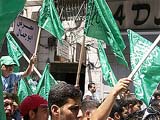Addressing Hamas
By Dominic Moran for ISN
With Palestinian reconciliation talks foundering and prospects for a united Palestinian state in doubt, it is crucial that the international community reassesses its rejection of relations with Hamas.
The mistakes that led to the overthrow of Fatah authority in Gaza are being repeated: an obsessive focus on security structures and a failure to prevent the blatant politicization of aid funds.
In Gaza, the gaffes of the Lebanon reconstruction effort are also in evidence with a direct contest with Iran encouraged by Arab and western efforts to back Ramallah. This contest encourages the strengthening of the Islamic movement's ties with Tehran.
The stark difference in the relative health of Hamas and Fatah was on show in the recent decision to again delay the holding of the sixth Fatah General Congress. This as Hamas held successful, if limited, internal elections that confirmed the roles of the current leadership and the movement's far greater overall unity.
In current US and Arab moves to establish the basis for renewed peace talks it is crucial to stop ignoring the internal Palestinian division and to provide a step-by-step process to draw Hamas into an eventual direct dialogue with the international community.
The Quartet's adherence to conditions for dialogue with Hamas have only served to bolster the popularity of the movement as the guardian of resistance in the face of Israeli intransigence and a purportedly quisling Fatah authority.
Hamas understands that its ideological adherence to the "resistance option" and to the long-term establishment of a Sharia-observant polity in all of historical Palestine is discursive and political. This, as evinced in repeated offers of a 10-year hudna (truce) and intimations from Hamas leaders of a willingness to acknowledge the pre-1967 borders, if not a two-state solution.
Due to both religious and political considerations, Hamas cannot be expected to move beyond its current hudna offer in the short term. However, a decade's break from the armed struggle with Israel would almost certainly signal the end of armed resistance as an option and would likely see the transformation of Hamas into a primarily political movement.
With the stick already in place in the form of the Israeli-Egyptian isolation of the Gaza Strip, the carrot could, at first, take the form of indirect negotiations through Egypt with Hamas on Gaza reconstruction and the opening of border crossings.
The sidelining of Fatah would be an unfortunate but necessary short-term consequence of such approaches while providing an important prod for Fatah in forgoing its current plans for the unilateral establishment of a new interim government.
Hamas moderates are keen for wider acknowledgement of their important decisions in the past to entertain a role in the PLO and PA governance structures. This can be played on in encouraging a reappraisal of current tendencies within the movement to scupper unity talks.
As with Hizbollah, the danger of a failure to disarm are clear and pressing both for Israel and Fatah but can be attenuated by a quid pro quo whereby an unstated dropping of armed struggle is accompanied by the gradual incorporation of Hamas members into leadership positions within the Palestinian security services.
A lot of water needs to flow under the bridge before this happens, with intervening moves required by both Fatah and Hamas – notably an end to the current targeting of the others' social, political and militant support networks.
Nonetheless, the buttressing of competing authorities in Gaza and Ramallah cannot be allowed to continue if there is any hope for the establishment of a Palestinian state at peace with Israel.

